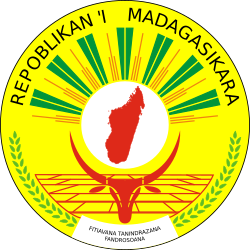Party Abbreviation Ideology Notes Association for the Rebirth of Madagascar Andry sy Rihana Enti-Manavotra an'i Madagasikara AREMA Left-wing nationalism Ruling party during the Democratic Republic of Madagascar . AMM - Avotantsika Miaraka i Madagasikara AMM created May 2023 [ 3] Congress Party for the Independence of Madagascar Parti du Congrès de l'indépendance de Madagascar AKFM Communism Marxism Affiliated with AREMA . APM - Antoko Politika Madio APM FTT - Firaisankinan’ny Tia Tanindrazana FTT party of Tahina Razafinjoelina [ 4] Judged by Your Work Party Asa Vita no Ifampitsarana Akaiky ny Vahoaka Indrindra AVI Centrism — Hery Vaovao ho an'i Madagasikara HVM former president's Hery Rajaonarimampianina party Economic Liberalism and Democratic Action for National Recovery Libéralisme économique et action démocratique pour la reconstruction nationale LEADER-Fanilo Economic liberalism Liberal democracy — Manaovasoa Manaovasoa Manaovasoa — Formed by a former AKFM leader. Movement for the Progress of Madagascar Mpitolona ho an'ny Fandrosoan'i Madagasikara MFM Liberalism Former socialistic party. Madagascar for the Malagasy Madagasikara otronin'ny Malagasy MONIMA Malagasy nationalism — Rebirth of the Social Democratic Party Rénaissance du Parti Social-Démocratique RPSD Social democracy — Fampandrosoana Mirindra Fampandrosoana Mirindra — — — Fanjava Velogno Fanjava Velogno — — — Fihavanantsika Fihavanantsika — — — Isandra Mivoatsa Isandra Mivoatsa — — — Liaraike Liaraike — — — Mayors' Association Association de Maires AM — — MMM - Malagasy Miara-Miainga MMM Centrism Member of Centrist Democrat International National Wisa Association Association Nationale Wisa ANW — — Our Madagascar — — — Union — — — Vohibato Tapa-kevitsa Vohibato Tapa-kevitsa VTK — — Party Where the People Are the Priority Antoko ny Vahoaka Aloha No Andrianina AVANA Centrism — Madagascar Green Party Antoko Maitso Hasin’i Madagasikara AMHM Green politics Political ecology — National Unity, Freedom & Development Fahalalahana sy ny Fampandrosoana FFF — — Party With Us Parti Hiaraka Isika PHI — — Pillar of Madagascar andri-Madagasikara AIM — — Social Democratic Party of Madagascar Parti social démocrate de Madagascar et des Comores PSD Social democracy Democratic socialism Social-ecology Originally supported continued links with France . TT - Tsara Tahafina TT — founded 2021 by Auguste Paraina [ 5] VPHM - Vondrona Politika hafa Miray VPHM — Filling its own pockets [ 6] Political-based Groups Working Together Vondrona Politika Miara dia Malagasy Miara Miainga VPM-MMM — — 